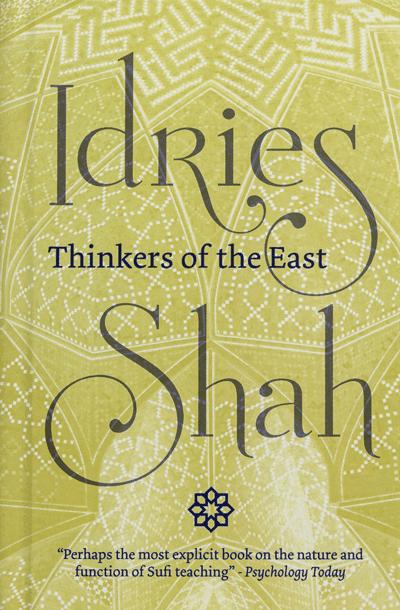A collection of entertaining Sufi anecdotes and ‘parables in action’ from the Middle East and Central Asia illustrating the practical and lucid approach of Eastern dervish teachers.
Thinkers of the East is a collection of short but potent teaching-stories distilled from the guidance of more than one hundred sages in three continents. The recorded narratives ranging from dialogues, to fables, to conversations, to legends, stresses the experiential impact of Sufi knowledge in living situations.
As the book’s subtitle Studies in Experientialism suggests, these tales illustrate Sufi thinking in action, rather than in abstract theory. The stories were arranged partly with this in mind by the author to counteract the Western idea of the East as a place of convoluted spiritual and philosophical theory without tangible practice.
As Idries Shah writes, ‘Without direct experience of such teaching, or at least a direct recording of it, I cannot see how Eastern thought can ever be understood.’
Thinkers of the East is a book of enormous breadth and depth, the impact and vitality of which reflect the Sufi emphasis on the human illuminate’s action upon the world.
‘In its claims and statements about the role of contemporary Sufism it is more open than any of Shah's books.’
New York Times
‘[Will] appeal to the modern man who finds current materialistic outlooks and attitudes insufficient to his needs.’
The Times Literary Supplement
‘An intensely contemporary application of specialised knowledge.’
New Society
‘Even at cursory reading, a deep and subtle psychology is apparent.’
Evening News
‘Perhaps the most explicit book on the nature and function of Sufi teaching—and perhaps the most remedial.’
Professor Robert Ornstein, Psychology Today
Preface
Subjects Dealt With in Thinkers of the East
A Death is Indicated
Ordinary
Bravery
A Disciple of Haidar
The Most Great Name
The Book of Wisdom
Kadudar and the Pilgrimage
Dismissal
Words of Israil of Bokhara
Lands of the Gurus
Nili
How Man Is Sustained
Jan Fishan and the Seeker
Objectors
Exclusion
The Philosopher’s Stone
Barbari and the Imitator
Iskandar of Balkh
Ali, Son of the Father of the Seeker
Rabia el-Adawiya
Abboud of Omdurman
Ajami
Conversion
Raised and Cast Down
Perplexity
Admonition to Disciples
Hasan of Basra
What to Do
The Test
The Hundred Books
Vehicle
The Formula
The Lives and Doings of the Masters
Change
Appetite
Oil, Water, Cotton
Sayed Sabir Ali-Shah
In Mecca
Halqavi
The Journeys of Kazwini
Inconsistencies
A Report by Kirmani
The Land of Truth
Language
Almost an Apple
Etiquette
Reactions
Motivation
Three Interpretations
Farmyard
Streaky Sand
To Seek to Learn to Seek
The Necessity for the Teaching
Observing One’s Own Opinions
Great Worth
Analogy
Lucky People
Value for Money
The Man Who Gave More – and Less
When Even Kings Are Weak...
Conversion
Astrology
I’ll Make You Remember
The Next Generation
If He Looks Good, He Is Good
Ruling and Ruled
Hariri the Good Man
Camlet
Respect
The Legend of the Three Men
Mystery
Merchant of Secrets
Distant Projection
Imam Baqir
Ajnabi
Rahimi
Reading
Haji Bektash Wali
The Book of Nonsense
Shakir Amali
How and What to Understand
Displacement
Dividing Camels
Revolting
Laws
Example
The Miracle
Every Luxury
Unsuitable
Sayed Sultan
Three Men of Turkestan
Feeling
The Precious Jewel
The Price of a Symbol
The Water-Wheel
Rauf Mazari
Meaning of a Legend
Ardabili
Inward and Outward Knowledge
The Secret Teacher
A Morning’s Marketing
Moss
Bahaudin and the Scholar
Visiting and Obtaining
Bahaudin
Bahaudin Naqshband
Storing and Transmitting
How it Feels to Be a Teacher
Founding of a School
Opulence
Wisdom
Luxury and Simplicity
The Caravan
Giant Apples
Effort
The New Initiate
Unanswerable
Literalism
Hilmi
The High Knowledge
Charikari
Hazrat Bahaudin Shah
Difficult
Presents
Nahas
Chances
Siyahposh
The Embassy from China
The Question
Transition
Seeing
The Deputation from Syria
Literature
Environment
Andaki
Buyer and Seller
Learning by Signs
The Pardoned Murderer
Halabi
The Abode of Truth
Rights and Duties
Alisher Nawai
The Design
Ghazali
The Rules of the Schools
Bahaudin Naqshband Discipleship and Development
Counsels of Bahaudin
The Legend of Nasrudin
The Sufi Quest
Idries Shah was born in India in 1924 into an aristocratic Afghan family. He was an author and teacher in the Sufi tradition and is considered one of the leading thinkers of the 20th century.
Shah devoted his life to collecting, translating and adapting key works of Sufi classical literature for the needs of the West. Called by some 'practical philosophy' - these works represent centuries of Sufi and Islamic thought aimed at developing human potential. His best-known works include the seminal book The Sufis, several collections of teaching stories featuring the ‘wise fool’ Nasrudin, Reflections and Knowing How to Know.
Shah's corpus - over three dozen books on topics ranging from psychology and spirituality to travelogues and cultural studies - have been translated into two dozen languages and have sold millions of copies around the world. They are regarded as an important bridge between the cultures of East and West.
